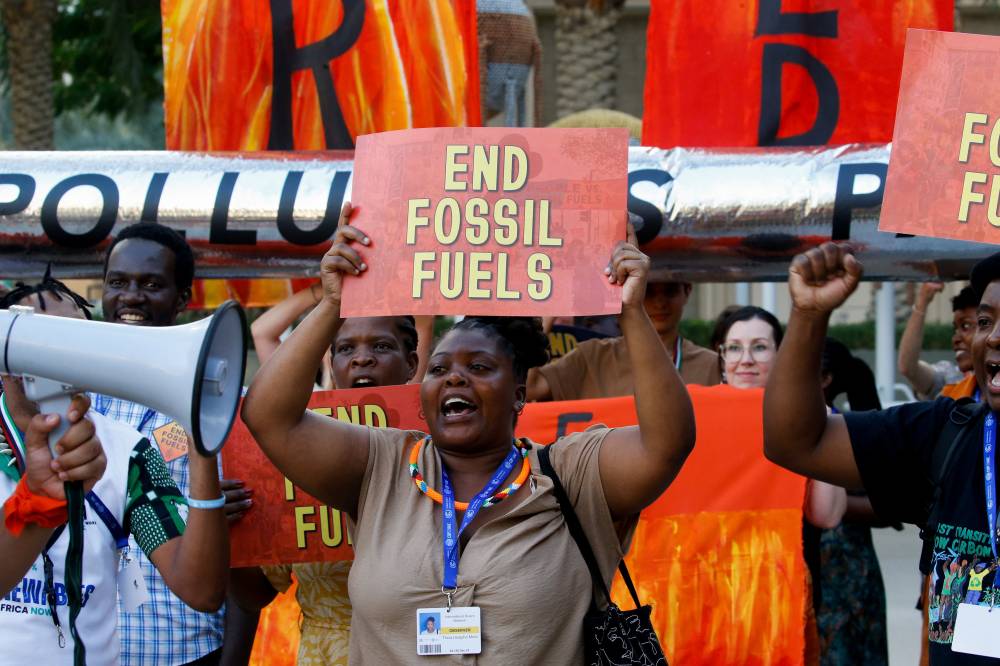COP28 clashes over fossil fuels

DUBAI—Some countries are resisting a pledge to phase-out fossil fuels in a COP28 climate deal, jeopardizing attempts for UN climate talks to deliver a hard commitment for the first time in 30 years on ending the use of oil and gas.
Observers in the negotiations said Saudi Arabia and Russia were insisting that COP28 focus only on reducing climate pollution—with no mention of the fossil fuels causing it.
Earlier this week, Opec sent a letter urging its members and oil producing allies to reject any mention of fossil fuels in the final summit deal. The letter warned that “undue and disproportionate pressure against fossil fuels may reach a tipping point” in the talks.
In a statement to Reuters, Opec secretary general Haitham Al Ghais declined to comment on the letter, but said Opec wanted to keep the summit’s focus on reducing climate-warming emissions, and away from their main source—coal, oil and gas.
“The world requires major investments in all energies, including hydrocarbons,” he said. “Energy transitions must be just, fair and inclusive.”
It was the first time Opec’s Secretariat has intervened in the UN climate talks with such a letter.
“It indicates a whiff of panic,” said Alden Meyer of think-tank E3G.Saudi Arabia is an Opec member. Russia is a member of the so-called Opec+ group.
‘On the wrong side’
By insisting on focusing on emissions rather than fossil fuels, the two countries appeared to be leaning on the promise of expensive carbon capture technology, which the UN climate science panel says cannot take the place of reducing fossil fuel use worldwide.
On the other side, at least 80 countries including the United States, European Union and many poor, climate-vulnerable nations are demanding that a COP28 deal call clearly for an eventual end to fossil fuel use.
Other countries including India and China have not explicitly endorsed a fossil fuel phase-out at COP28, but have backed a popular call for boosting renewable energy.
Ireland’s former president, Mary Robinson, who heads a group of former world leaders known as the Elders, said the letter showed Opec was “worried” about the trajectory of the COP28 talks.
“Russia and Saudi Arabia are on the wrong side of this and will probably be pushing hard,” Robinson said. “We really have to make sure that the tipping point tips the right way.”
With the summit’s scheduled to end on Tuesday, government ministers from the nearly 200 countries at the Dubai summit have joined in trying to resolve the fossil fuel impasse.
Climate-vulnerable countries said a rejection of a fossil fuel mention at COP28 would threaten the entire world.
“Nothing puts the prosperity and future of all people on earth, including all of the citizens of Opec countries, at greater risk than fossil fuels,” said Marshall Islands climate envoy Tina Stege in a statement.
Range of options
The Marshall Islands, which faces inundation from climate-driven sea level rise, currently chairs the High Ambition Coalition group of nations pushing for stronger emissions-cutting targets and policies.
To meet the global goal of holding climate warming to within 1.5 degrees Celsius above preindustrial temperatures, the coalition “is pushing for a phase out of fossil fuels, which are at the root of this crisis,” she said. “1.5 is not negotiable, and that means an end to fossil fuels.”
The latest version of the negotiating text, released Friday, shows countries were still considering a range of options—from agreeing to a “phase out of fossil fuels in line with best available science,” to phasing out “unabated fossil fuels,” to including no mention at all.
Germany’s climate envoy Jennifer Morgan said counties were “moving into the critical stage of negotiations.”
“It is time for all countries to remember what is at stake,” she said. “I am concerned that not all are constructively engaging.”
Asked about the Opec letter, COP28 director general Majid Al Suwaidi avoided the term “fossil fuels” but said the UAE, as president of the summit, wanted a deal to get the world on track to limit warming to 1.5 degrees Celsius. —REUTERS
Reuters, the news and media division of Thomson Reuters, is the world’s largest multimedia news provider, reaching billions of people worldwide every day. Reuters provides business, financial, national and international news to professionals via desktop terminals, the world's media organizations, industry events and directly to consumers.
















